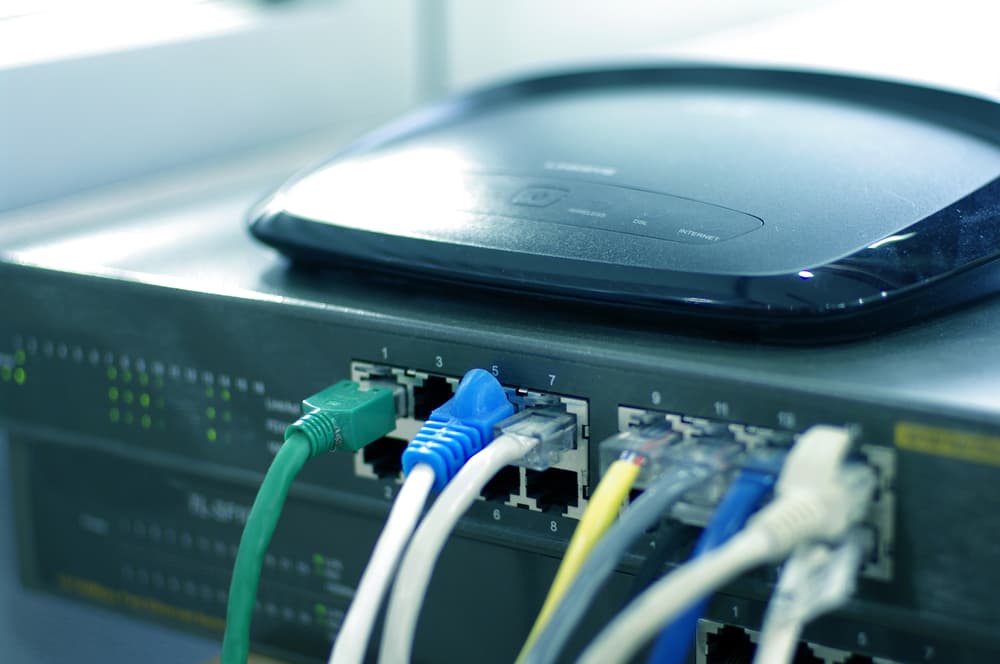In the fast-paced world of modern business, choosing wired and wireless networks is a critical decision that impacts connectivity, productivity, and overall operational efficiency. Each networking option has its own advantages and drawbacks, influencing factors such as speed, security, scalability, and cost.
Let's delve into the pros and cons of wired and wireless networks, backed by relevant statistics. To discuss your company’s network options, consult with IT experts near you.
Wired Network

Some of the advantages of wired networks include the following:
Speed and Reliability
Wired networks, particularly Ethernet connections, are known for their reliability and consistent high-speed performance. They offer low latency and stable bandwidth, making them ideal for bandwidth-intensive tasks.
Security
Wired networks are generally considered more secure than their wireless counterparts. The physical connection reduces the risk of unauthorized access, as an individual needs direct access to a wired port to gain network entry.
Stability in High-Density Environments
In environments with a high density of devices, such as an office with numerous computers, wired networks provide more stable and predictable performance than wireless networks.
Lower Interference
Wired connections are less susceptible to interference from other electronic devices, neighboring networks, or physical obstacles. This results in a more consistent and reliable network experience.
Wired networks also can have some drawbacks, including:
Installation and Maintenance Costs
The initial setup of wired networks can be more expensive due to cabling, switches, and other hardware costs. Additionally, maintenance and troubleshooting may require specialized knowledge and resources.
Limited Mobility
Wired networks restrict mobility as devices are physically tethered to the network through cables. This limitation can be a drawback in modern, dynamic work environments prioritizing flexibility and mobility.
Scalability Challenges
Expanding a wired network to accommodate additional devices or cover a larger area may require extensive cabling and infrastructure adjustments. This can be a logistical challenge and may incur additional costs.
Wireless Networks
On the other hand, here are some common pros of wireless networks for your business.
Mobility and Flexibility
Wireless networks provide unparalleled mobility, allowing users to connect anywhere within the coverage area. This flexibility is particularly beneficial in modern workplaces where mobility is a key consideration.
Lower Initial Setup Costs
Setting up a wireless network is often more cost-effective initially, as it eliminates the need for extensive cabling infrastructure. This can be advantageous for businesses with budget constraints.
Ease of Installation and Scalability
Wireless networks are relatively easy to install and can be quickly scaled to accommodate additional devices or cover larger areas. This scalability is advantageous for businesses experiencing growth or changes in workspace layout.
Adaptability to Changing Environments
Wireless networks are adaptable to dynamic office environments, allowing for easy modifications and adjustments as needed. This adaptability aligns well with the evolving nature of modern workplaces.
Wireless networks might also have some disadvantages for certain types of companies and operations, including:
Limited Bandwidth and Potential Interference
Wireless networks may experience reduced bandwidth and potential interference, especially in crowded areas with numerous connected devices. This can lead to decreased performance and reliability.
Security Concerns
Wireless networks are more susceptible to unauthorized access and security breaches. Despite advancements in wireless security protocols, the risk of hacking and data interception is higher than wired networks.
Varied Performance
Wireless performance can decrease due to distance from the access point, physical obstacles, and interference from other electronic devices. This variability may impact the user experience.
Statistics on Wired vs. Wireless Networks:
Wireless Internet Usage Trends
According to the International Telecommunication Union (ITU), the percentage of the global population using the internet wirelessly surpassed those using wired connections in recent years, highlighting the growing prevalence of wireless connectivity.
Enterprise Wi-Fi Adoption
A recent report indicates that worldwide enterprise WLAN (Wireless Local Area Network) market revenue reached $6.1 billion in the first quarter of last year, reflecting businesses' widespread adoption of wireless solutions.
Business Preference for Wired Connections
One survey found that 65 percent of businesses still prefer using wired network connections, citing reliability and security as primary considerations.
Wi-Fi Security Concerns
Many organizations express concerns about the security of Wi-Fi networks, identifying potential threats related to unauthorized access. You need an IT team that follows best practices when securing your wireless network.
Rising Demand for Wi-Fi 6
The Wi-Fi 6 (802.11ax) standard, designed to enhance wireless performance, is gaining traction. One forecast predicted that Wi-Fi 6 device shipments are ready to surpass one billion units annually.
Making the Right Choice for Your Business
Choosing between wired and wireless networks depends on various factors, including the business's specific needs, budget considerations, and the nature of the work environment. In many cases, a hybrid approach that combines the strengths of both wired and wireless technologies may be the most effective solution.
Ultimately, businesses should carefully assess their requirements, consider the long-term implications, and leverage the advantages offered by each networking option to create a robust, reliable, and efficient connectivity infrastructure.
IT Professionals Can Setup Your Wired or Wireless Network
Setting up a reliable and efficient network is crucial for the seamless functioning of any modern business or home environment, and IT professionals play a pivotal role in this process. Whether configuring a wired or wireless network, these experts systematically ensure optimal connectivity and security.
For wired networks, IT professionals begin by strategically planning the layout and placement of Ethernet cables to establish a stable and high-speed connection. They meticulously install network switches, routers, and other hardware components, ensuring proper cable management to minimize interference and maintain a tidy infrastructure.
The configuration involves:
- Assigning IP addresses.
- Setting up security protocols.
- Implementing quality-of-service measures for prioritized data flow.

In the case of wireless networks, IT professionals employ their experience to select the most suitable Wi-Fi standards and frequencies based on the environment's specific needs. They strategically position access points to maximize coverage and minimize dead zones, considering potential sources of interference. Security measures, such as encryption protocols and strong passwords, are implemented to safeguard against unauthorized access.
IT professionals conduct thorough testing throughout the setup process to identify and resolve any connectivity issues, ensuring that the network meets performance expectations. Their proficiency in troubleshooting and optimizing network settings contributes to a robust and dependable infrastructure, enabling users to seamlessly connect and collaborate in today's digitally interconnected world.


